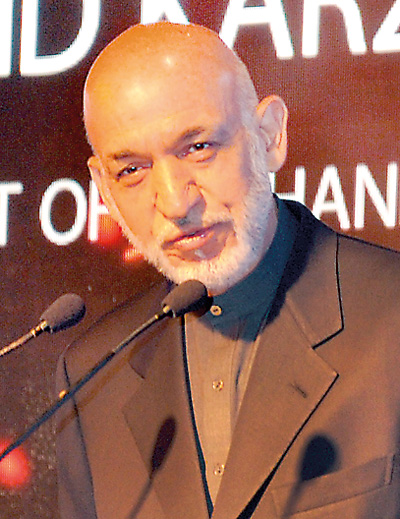News
Extremism, terrorism common threats to international community: Ex-president Karzai
Extremism and Terrorism should be considered common threats by the international community, to effectively combat the issue, said former Afghan President Hamid Karzai, in his keynote address at the inaugural session of ‘Defence Seminar – 2015’.
The two-day seminar for the fifth consecutive time held on the theme of ‘National Security in the Context of Emerging Global Threats,’ concluded this week.
“There will not be an end to extremism and terrorism unless the international community sees terrorism as a common threat to the world order. It certainly would not end if some of us were to say that it does not affect us. It is a collective urge if we were to get out of it,” Mr. Karzai highlighted.
Drawing from the experience of his country, he said that it would be impossible for any non-State actor to carry out attacks without the support of external political forces. It is impossible for any State actors to be active and to inflict damage on another country without the help of another non-State actor.” Similarly, he said that “it is impossible for a person to carry a gun and move miles and miles without the support of another person. The support is from another State”Analysing there are only two options to establish peace and stability devoid of extremism and terrorism in the world, he said only a return of morality in international politics and balance of power in the world order would yield results.
“The return to morality and moral consideration into policymaking and policymakers, especially to the main actors. To end human suffering, we have to reach a collective decision by collectively approaching it. Therefore, this morality is the tool that could save the countries, particularly the poorer ones, from the grip of terrorism” Mr. Karzai claimed.
Explaining the alternative to morally charged international politics, he said that a return to a balance of power in international politics may also help establish peace and rid the world of terrorism. Mr. Karzai highlighted the need for the world’s main superpower United States and NATO allies to consult other world powers Russia, China and India, to establish a balance of power system in the current world order.

Hamid Karzai delivering the keynote address
Mr. Karzai explained how his country Afghanistan, which had long been a battleground for two international political ideologies, defeated extremist group Taliban, following collective international effort after the September 11 attack in 2009.
Agreeing with Mr. Karzai’s views, Prof Christoper Coker, Professor of International Relations at London School of Economics, highlighted five factors affecting the world today, which were common to the situation in the 1930s, before the world wars. Firstly, the economic recession which the world is only coming out of at present.
Secondly, the clash of values which he explained as a cultural battle. Highlighting how Russia and the West are engaged in a cultural battle, where the former is not involved in global issues, Mr. Coker said that there is a serious cultural conflict. Third, he said there is a strategic vacuum, as the U.S. is no longer the great power in the world.
The fourth, Mr. Coker explained that the revisionist great power Russia is challenging the international order by annexing territory viz, Crimea, and effectively partitioning Ukraine by supporting the separatists. Highlighting the possibility of the emergence of another revisionist power, China, Mr. Coke said that it would be important to be aware of the Russian factor, even though it has not affected the Asian region.
Fifth factor, the weakened United Nations has resulted in a heightened humanitarian crisis causing immense suffering and a refugee crisis affecting the western part of the world, he said. Adding to this, Prof Coker said there are two more factors which are affecting the world order today, social inequality and climate change.
Speaking on Challenges and Implications to National Security from a West Asian perspective, Prof. Rashed Uz Zaman- Department of International Relations, University of Dhaka, also highlighted the conflicts arising from environmental insecurities.
Drawing on the Syrian example, he explained how States have failed in providing for their citizens due to challenges posed by changes in environment. Highlighting that the “environment has wreaked havoc in Syria” and played a major role in the Syrian crisis,” he said.
“Equally important is the State should be able to provide for its people. If the State is not able to provide services to its people, if the State is not able to provide jobs, water and electricity, it becomes very important. If the State is not able to provide these to it’s people, the non-State actors, political ‘entrepreneurs take advantage” he explained.

